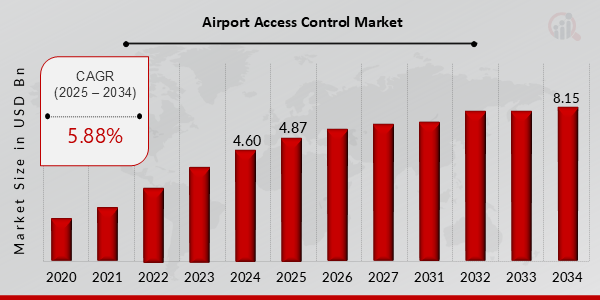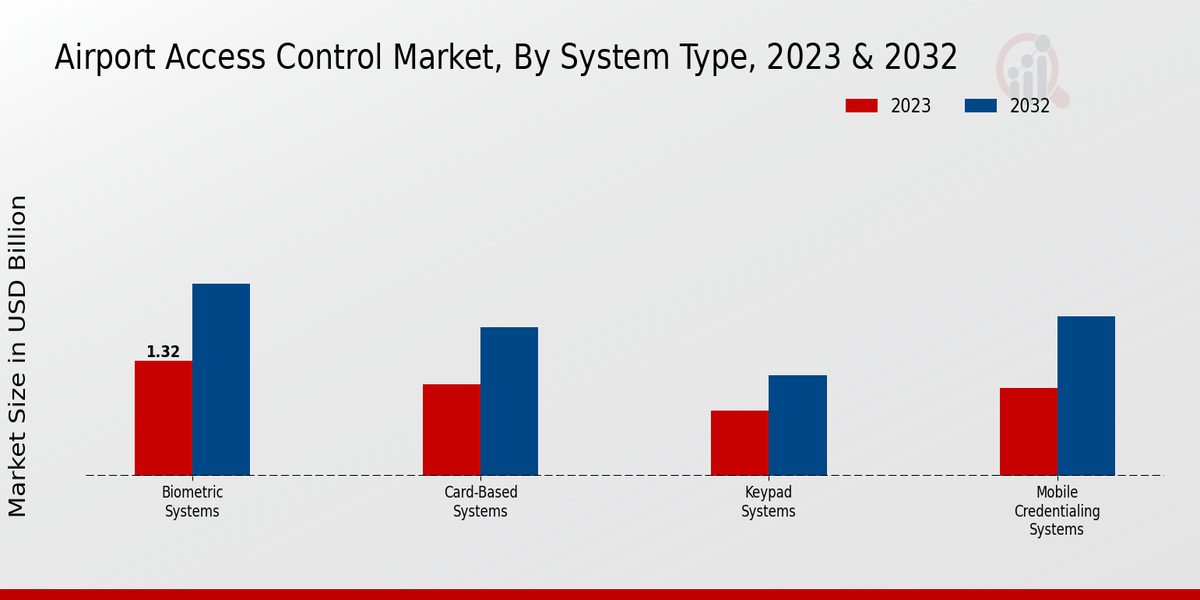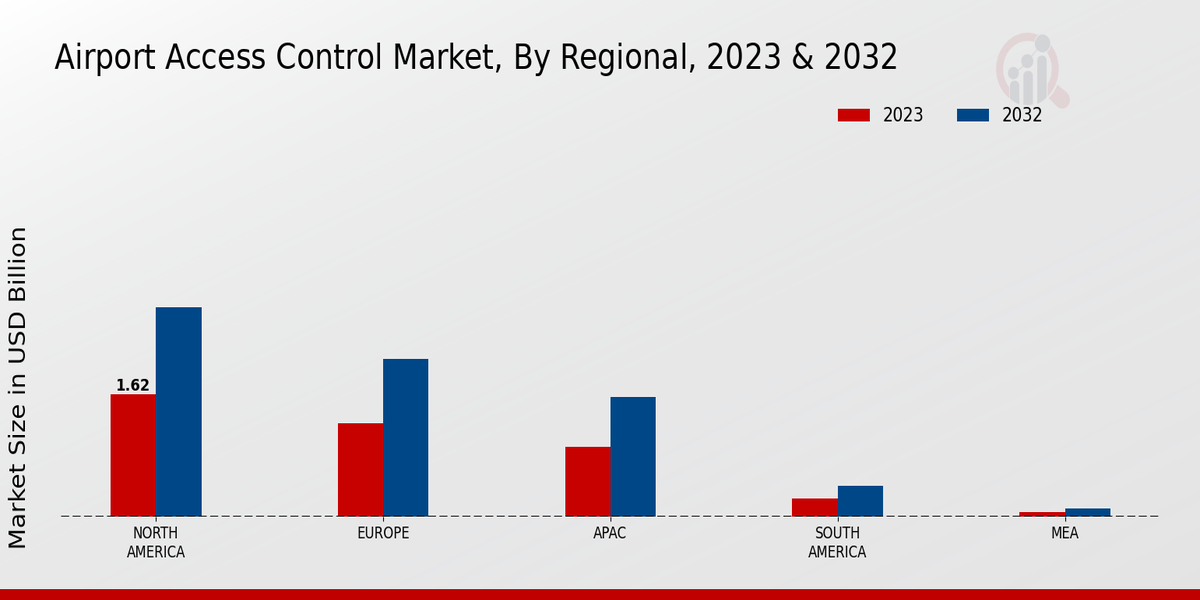Global Airport Access Control Market Overview:
The Airport Access Control Market Size was estimated at 4.60 (USD Billion) in 2024. The Airport Access Control Market Industry is expected to grow from 4.87 (USD Billion) in 2025 to 8.15 (USD Billion) till 2034, exhibiting a compound annual growth rate (CAGR) of 5.88% during the forecast period (2025 - 2034).
Key Airport Access Control Market Trends Highlighted
The global airport access control market is witnessing significant growth driven by increasing security concerns and the rising number of air travelers. Airports are investing in advanced technologies such as biometrics, smart cards, and facial recognition systems to enhance their security measures. This heightened emphasis on security is prompted by the need to protect passengers and airline operations from potential threats. Furthermore, regulatory mandates and international standards related to airport safety are necessitating the adoption of modern access control solutions. The integration of Internet of Things (IoT) devices in access control systems is also bolstering the market, making it more efficient and responsive.
Emerging opportunities within this market include the development of more user-friendly access control systems that improve passenger experience while maintaining high security. As airports expand and modernize, there is potential for innovation in mobile access solutions, such as the use of smartphones for seamless airport entry. Additionally, global events, like the reopening of travel after the pandemic, present chances to enhance airport infrastructure with modern access control technologies. Collaborations between technology providers and airport authorities can lead to tailored solutions that meet specific security needs.
Recent trends indicate a shift towards automation and integration of access control systems with other airport operations.The growing popularity of touchless technology is responding to health and safety concerns, enhancing passenger convenience at every touchpoint. Many airports are now focusing on holistic security systems that not only control access but also facilitate quick data analysis and response, ultimately improving overall airport operations. The evolving landscape of airport access control is shaping a safer and more efficient travel experience for passengers worldwide.

Source: Primary Research, Secondary Research, MRFR Database and Analyst Review
Airport Access Control Market Drivers
Increasing Global Air Travel Demand
The rising demand for air travel on a global scale is a significant driver for the Global Airport Access Control Market Industry. As international and domestic travel continues to gain momentum, airports are under pressure to enhance their security and access control systems to manage the increased flow of passengers. This demand has driven investments in advanced access control technologies that help in streamlining passenger processing while ensuring high levels of security.For example, innovative systems like biometric identification, electronic gates, and automated access control solutions are being adopted to improve both security and passenger experience.
These advancements not only reduce wait times at security checkpoints but also enhance the overall efficiency of airport operations. As air travel is projected to rise, so will the necessity for more sophisticated and reliable access control measures, positioning them as critical components of modern airport infrastructure.Therefore, the growing number of passengers is fundamentally propelling the market for airport access control solutions, enabling airports to better manage operations while maintaining safety protocols.
Technological Advancements
Technological innovations are playing a crucial role in the evolution of the Global Airport Access Control Market Industry. The integration of advanced technologies such as biometric verification, facial recognition, and mobile access control systems are redefining traditional security measures at airports. These technologies enhance the speed and accuracy of passenger authentication, thereby improving the overall efficiency of security checks. Furthermore, the ongoing development of Artificial Intelligence and machine learning technologies is enabling airports to predict and manage crowd flows better, optimizing access control processes.As technology continues to evolve, airports are motivated to adopt modern systems that not only comply with updated security requirements but also provide a seamless travel experience for passengers. This adoption too is expected to drive significant growth in the market.
Government Regulations and Security Initiatives
Stringent government regulations aimed at enhancing airport security are a major factor influencing the Global Airport Access Control Market Industry. With increasing threats to aviation security, government agencies worldwide are mandating the implementation of robust access control systems at airports. Compliance with various national and international security standards has become imperative, leading airports to invest in state-of-the-art access control technologies.These initiatives are not only focused on improving physical security but also on integrating data management systems to monitor and respond to potential threats effectively. This regulatory framework fosters a conducive environment for the growth of the access control market, as airports strive to meet compliance requirements while prioritizing passenger safety.
Airport Access Control Market Segment Insights:
Airport Access Control Market System Type Insights
The System Type segment of the Global Airport Access Control Market showcases a range of access control technologies that cater to different security needs within airports. In 2023, the overall market is valued at 4.11 USD Billion and is projected to grow substantially by 2032. Within this segment, Biometric Systems hold a significant position, with a valuation of 1.32 USD Billion in 2023 and expected to reach 2.2 USD Billion by 2032. The increasing demand for enhanced security measures and streamlined passenger flow largely drives the growth of Biometric Systems, as they offer a high level of accuracy and efficiency in identity verification.
Card-Based Systems follow closely, valued at 1.05 USD Billion in 2023, and anticipated to expand to 1.7 USD Billion by 2032, highlighting their continued relevance in airport security frameworks due to their user-friendliness and integration capabilities with existing systems. Keypad Systems, while historically less dominant, show promising growth potential. Valued at 0.74 USD Billion in 2023 and expected to rise to 1.15 USD Billion by 2032, these systems are cost-effective and easy to implement, making them an attractive option for smaller airports or specific airport areas requiring access control. In contrast, Mobile Credentialing Systems are increasingly gaining traction with a 2023 valuation of 1.0 USD Billion and a forecast to increase to 1.82 USD Billion by 2032. This trend is driven by the growing use of mobile devices for secure access, catering to tech-savvy travelers who prefer the convenience of mobile credentials over traditional methods.
The overall Global Airport Access Control Market segmentation illustrates a varied landscape, with each technology offering unique advantages. The market data indicates that as security needs evolve and technology advances, airports must adapt by integrating various systems to create a comprehensive security solution. Each of these systems plays a critical role in enhancing the security infrastructure of airports, meeting both operational demands and passenger expectations. Overall, the combination of these technologies reflects an increasing focus on safety, efficiency, and innovation in the Global Airport Access Control Market industry, making it an essential area for investment and development in the coming years.

Source: Primary Research, Secondary Research, MRFR Database and Analyst Review
Airport Access Control Market Access Control Solution Insights
The Access Control Solution segment of the Global Airport Access Control Market is a critical framework designed to enhance security and operational efficiency within airport environments. In 2023, this market is valued at 4.11 billion USD, and it exhibits a strong growth trajectory leading to a projected value of 6.87 billion USD by 2032. The market segmentation comprises Hardware, Software, and Services, each playing a vital role in maintaining robust security protocols. Hardware, including biometric systems and card readers, has gained significant traction due to its ability to provide efficient identification and access management.Software solutions are pivotal for integrating various access controls and ensuring real-time monitoring, thus reinforcing airport security measures. Additionally, Services encompass installation and maintenance, ensuring that all systems remain operational and effective. Overall, the Global Airport Access Control Market data reflects a growing need for improved safety standards, driven by rising passenger volumes and increasing security threats, creating substantial opportunities for market participants.
Airport Access Control Market End User Insights
The Global Airport Access Control Market is a rapidly evolving landscape, expected to be valued at 4.11 USD billion in 2023 and reaching 6.87 USD billion by 2032, depicting a stable growth trajectory. The End User segment encompasses diverse entities including Airlines, Airport Authorities, Government Agencies, and Security Companies, each playing a crucial role in the market's dynamics. Airlines significantly drive the demand for access control systems to enhance passenger experiences and ensure operational efficiency, while Airport Authorities prioritize security and safety protocols within their premises.
Government Agencies contribute by implementing regulations and policies that necessitate stringent access controls, thereby shaping market requirements. Security Companies hold a significant share as they offer advanced technologies and solutions to meet the evolving security challenges faced by airports. The market is poised for growth, spurred by increasing passenger traffic, technological advancements, and a heightened focus on security measures; however, challenges such as budget constraints and regulatory compliance may impact expansion strategies.The segmentation of the Global Airport Access Control Market underlines the importance of collaboration across these entities to optimize airport security and management.
Airport Access Control Market Application Insights
The Global Airport Access Control Market is projected to exhibit significant growth, driven by its diverse Applications, which comprise Passenger Access Control, Baggage and Cargo Access Control, and Staff and Employee Access Control. In 2023, the overall market was valued at 4.11 USD Billion, setting a solid foundation for upcoming expansion. Passenger Access Control holds a pivotal role, ensuring an efficient transit experience while enhancing security measures for travelers. This segment is complemented by Baggage and Cargo Access Control, which emphasizes the importance of safeguarding luggage and goods, directly influencing operational efficiency and passenger satisfaction.
Staff and Employee Access Control is crucial for maintaining safety and regulatory compliance within airport environments, further solidifying the importance of a well-rounded access control system. With a level of integration between these applications, the airport access control industry is positioned to adapt to evolving security concerns, technology advancements, and regulatory requirements, fostering opportunities and addressing challenges in a dynamic market landscape. The Global Airport Access Control Market statistics highlight its growth potential, fueled by ongoing investments in technology and infrastructure across the aviation sector, contributing to overall market growth.
Airport Access Control Market Regional Insights
The Global Airport Access Control Market, valued at 4.11 USD Billion in 2023, showcases diverse regional performance with notable segmentation across North America, Europe, APAC, South America, and MEA. North America leads with a valuation of 1.62 USD Billion in 2023, accounting for a significant portion of the market and reflecting its importance due to advanced infrastructure and high security standards. Europe follows closely with 1.24 USD Billion, driven by stringent regulations and increased security measures at airports. APAC, valued at 0.93 USD Billion, is emerging with rapid growth as regional airports modernize their access control systems.South America and MEA, while smaller in scale with 0.25 USD Billion and 0.07 USD Billion respectively in 2023, present opportunities for growth as security concerns rise and air travel increases. The significant portion held by North America is indicative of its dominance, while APAC shows strong potential due to rising investments in aviation security technology, shaping overall Global Airport Access Control Market revenue trends.

Source: Primary Research, Secondary Research, MRFR Database and Analyst Review
Airport Access Control Market Key Players and Competitive Insights:
The Global Airport Access Control Market has become increasingly competitive as airports worldwide focus on enhancing security measures and technological advancements. With the threat of terrorism and other security challenges, the demand for sophisticated access control systems has grown substantially, driving innovations and investments in this sector. Various companies are now striving to develop integrated solutions that not only bolster security but also streamline passenger flow and enhance the overall travel experience. This market comprises numerous players, each looking to differentiate their offerings through unique technologies, partnerships, and customer service strategies. Understanding the competitive landscape is crucial for stakeholders aiming to navigate the complexities of this dynamic environment effectively.
Hewlett Packard Enterprise has positioned itself strongly within the Global Airport Access Control Market by leveraging its extensive experience in IT infrastructure and cloud-based solutions. The company emphasizes the integration of advanced technologies, such as artificial intelligence and analytics, into airport security systems. This focus enables airports to not only manage access control more efficiently but also to analyze data for better decision-making. Hewlett Packard Enterprise also benefits from its strong reputation for reliability and innovation, which enhances customer trust in its solutions. Furthermore, the company has established numerous partnerships with other security firms, allowing it to provide comprehensive, tailored solutions that address the diverse needs of various airport clients. Its robust market presence and commitment to ongoing research and development further strengthen its competitive position in this space.On the other hand, Axis Communications has carved a niche for itself through its pioneering contributions to networked security solutions in the Global Airport Access Control Market.
The company specializes in video surveillance and access control technologies, offering high-quality products that enhance airport security. Axis Communications is recognized for its commitment to innovation, frequently introducing cutting-edge technologies that integrate seamlessly with existing security systems. This ability to provide scalable and flexible solutions has allowed it to cater to airports of varying sizes and security requirements, establishing it as a trusted player in the industry. Additionally, Axis Communications has built a strong distribution network globally, enabling them to maintain a broad market presence and reach diverse clientele across many regions. Its focus on customer support and tailored solutions has further solidified its status as a leading provider in the airport access control domain.
Key Companies in the Airport Access Control Market Include:
Airport Access Control Market Industry Developments
The Global Airport Access Control Market has seen significant developments recently, including advancements in biometric technology and integration with IoT systems. Companies like Honeywell and Bosch Security Systems are enhancing their product offerings to improve security measures and passenger flow at airports. In terms of current affairs, there has been a notable increase in airport traffic recovery post-pandemic, driving demand for more sophisticated access control solutions.
Furthermore, companies such as Siemens and Magal Security Systems are actively participating in innovations aimed at harmonizing access control with advanced data analytics for enhanced situational awareness. Recent mergers and acquisitions have also shaped the market, particularly with Ingersoll Rand announcing strategic acquisitions to expand its security capabilities. Additionally, Axis Communications has been collaborating with various airports to implement cutting-edge surveillance and access technologies. Growth in market valuation is notable, driven by increased investments in security infrastructure and advanced technology solutions, impacting market dynamics and encouraging further innovation among key players like Raytheon Technologies, Assa Abloy, and Thales Group.
Airport Access Control Market Segmentation Insights
Airport Access Control Market System Type Outlook
Airport Access Control Market Access Control Solution Outlook
Airport Access Control Market End User Outlook
Airport Access Control Market Application Outlook
Airport Access Control Market Regional Outlook
| Report Attribute/Metric |
Details |
|
Market Size 2024
|
USD 4.60 Billion
|
|
Market Size 2025
|
USD 4.87 Billion
|
|
Market Size 2034
|
USD 8.15 Billion
|
|
Compound Annual Growth Rate (CAGR)
|
5.88% (2025-2034)
|
| Report Coverage |
Revenue Forecast, Competitive Landscape, Growth Factors, and Trends |
|
Base Year
|
2024
|
|
Market Forecast Period
|
2025-2034
|
|
Historical Data
|
2020-2023
|
| Market Forecast Units |
USD Billion |
| Key Companies Profiled |
Hewlett Packard Enterprise, Axis Communications, Cognitec Systems, Ingersoll Rand, Gunnebo, Honeywell, Bosch Security Systems, Amadeus IT Group, Johnson Controls, Raytheon Technologies, Assa Abloy, SITA, Siemens, Magal Security Systems, Thales Group |
| Segments Covered |
System Type, Access Control Solution, End User, Application, Regional |
| Key Market Opportunities |
Biometric security solutions expansion, Integration of AI technologies, Cloud-based access control systems, Enhanced passenger experience initiatives, Government investments in security upgrades |
| Key Market Dynamics |
Increasing security regulations, Technological advancements, Demand for biometric solutions, Rising air travel frequency, Integration with smart systems |
| Countries Covered |
North America, Europe, APAC, South America, MEA |
Frequently Asked Questions (FAQ) :
The Global Airport Access Control Market is expected to be valued at 8.15 USD Billion by 2034.
The projected CAGR for the Global Airport Access Control Market from 2025 to 2034 is 5.88%.
By 2032, North America is expected to hold the largest market share, valued at 2.77 USD Billion.
The market value of Biometric Systems in the Global Airport Access Control Market is expected to reach 2.2 USD Billion by 2032.
Key players in the Global Airport Access Control Market include major companies like Honeywell, Bosch Security Systems, and Siemens.
The expected market size for Card-Based Systems by 2032 is projected to reach 1.7 USD Billion.
The APAC region is projected to be valued at 1.58 USD Billion in the Global Airport Access Control Market by 2032.
The market value of Mobile Credentialing Systems in the Global Airport Access Control Market is forecasted to be 1.82 USD Billion by 2032.
South America is projected to reach a market value of 0.41 USD Billion in the Global Airport Access Control Market by 2032.
The estimated market value for Keypad Systems in the Global Airport Access Control Market is expected to be 1.15 USD Billion by 2032.

















